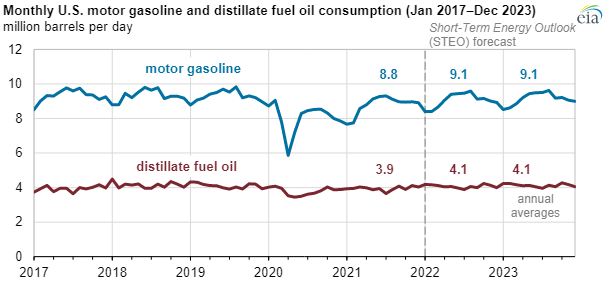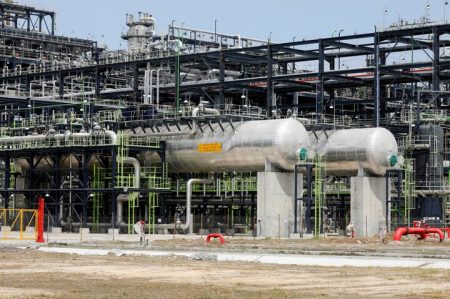NEW YORK — Oil prices jumped about 3% to a 13-week high on Wednesday as U.S. demand for gasoline has kept rising despite record pump prices, on expectations China’s oil demand will increase and on growing supply concerns in several countries.
 Brent futures rose $3.59, or 3.0%, to $124.16 a barrel by 1:02 p.m. EDT (1702 GMT). U.S. West Texas Intermediate (WTI) crude rose $3.49, or 2.9%, to $122.90.
Brent futures rose $3.59, or 3.0%, to $124.16 a barrel by 1:02 p.m. EDT (1702 GMT). U.S. West Texas Intermediate (WTI) crude rose $3.49, or 2.9%, to $122.90.
Brent and WTI were on track for their highest settlements since March 8, which were their highest since 2008.
U.S. commercial crude oil inventories rose unexpectedly last week, while crude in the Strategic Petroleum Reserve fell by a record amount as refiners’ inputs rose to their highest since January 2020, the Energy Information Administration said. read more
U.S. gasoline stocks fell by a surprise 0.8 million barrels as demand for the fuel rose despite sky-high pump prices. Analysts polled by Reuters had expected gasoline stocks to rise 1.1 million barrels.
“The gasoline draw is a highlight of the report with a tight marketplace across the U.S.,” said Tony Headrick, energy market analyst at CHS Hedging, noting demand remained strong even with pump prices above $5 per gallon in many parts of the country.
Auto club AAA said national average retail regular unleaded gasoline prices hit a record $4.955 per gallon on Wednesday.
“Oil prices are higher, supported by expectation of China easing the COVID restrictions, translating in higher demand and imports this summer,” UBS analyst Giovanni Staunovo said.
China’s major A-share indexes and Hong Kong’s Hang Seng finished trade at two-month closing highs. Oil traders expect fuel demand to recover as lockdowns to fight the pandemic are eased in the world’s biggest oil importer.
On the supply side, traders noted several countries could face problems boosting output.
In Norway, a number of oil workers plan to strike from June 12 over pay, putting some crude output at risk of shutdown.
Further pressuring the supply outlook, Iran removed two surveillance cameras of the International Atomic Energy Agency from one of its nuclear facilities, state television reported.
That move will probably raise tensions with the United Nations nuclear watchdog, the United States and other countries negotiating with Iran over its nuclear program, hoping for a deal analysts have said could lift sanctions and add 1 million bpd of crude to world supply.
Efforts by OPEC+ oil producers to boost output are “not encouraging”, United Arab Emirates’ energy minister Suhail al-Mazrouei said, noting the group was currently 2.6 million barrels per day (bpd) short of its target.
The International Energy Agency, meanwhile, warned that Europe, which has sanctioned Russia following its invasion of Ukraine, could face energy shortages next winter.
*Scott Disavino, Laura Sanicola, Ahmad Ghaddar & Florence Tan & Muyu Xu; Editing: Mark Potter, Kirsten Donovan & David Gregorio – Reuters
Follow us on twitter



